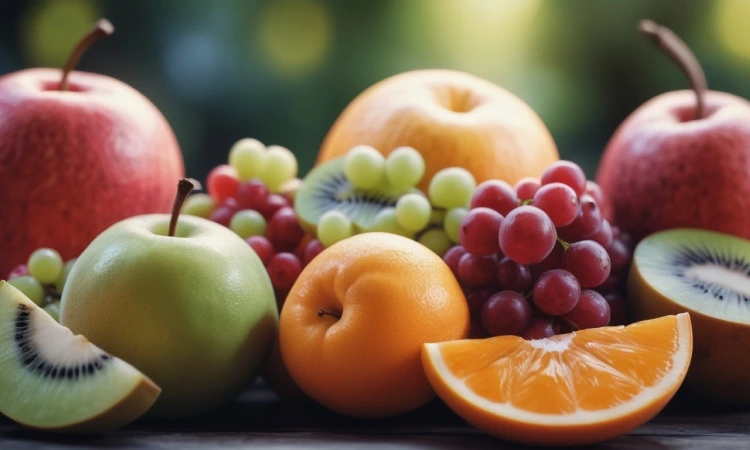Food is essential in our daily lives. Vitamins and minerals are necessary for the body in the food we consume. These fruits contain a lot of the daily vitamins and calories required by our body. Doctors recommend consuming these fruits daily. Below are the nutrients and benefits of the top ten delicious fruits.
1.Pomegranate
According to Dr. Heber, it contains the biggest and strongest known polyphenol antioxidant. Furthermore, this polyphenol is broken down into smaller molecules that enter the bloodstream via your intestines.

A single pomegranate (282 g) has
- 234 calories
- 52.7 g of carbohydrate
- 11.3 g of fiber
- 666 mg of potassium
- 28.2 mg calcium
- 28.8 mg vitamin C
Additionally, 46.2 micrograms (mcg) of vitamin K can be found in one pomegranate. For healthy blood cells and strong bones, this vitamin is necessary.
2.Bananas
It is well knowledge that bananas are high in potassium. A 126-gram banana has about 451 milligrams of potassium in it. The body uses potassium to regulate blood pressure.

The following nutrients can also be found in one banana
- 1.37 g protein
- 6.3 mg calcium
- 34 mg magnesium
- 11 mg vitamin C
You can include bananas in your diet because they are just as healthful as apples. They are packed with vital nutrients that may offer some health benefits.
3.Avocado
They are a rich source of healthy fats, or monounsaturated and polyunsaturated fats. Eating avocados is associated with lowering harmful (LDL) cholesterol levels.
Vitamins: Avocados have high levels of B, C, E, and K vitamins.

Avocados contain approximately 10 grams of fiber per fruit, or 1 gram every spoonful. They include a lot of digesting fiber.
One avocado (201 g) contains
- 322 calories
- 4.02 g protein
- 17.1 g carbohydrate
- 13.5 g fiber
- 24.1 mg calcium
- 58.3 mg magnesium
- 975 mg potassium
- 20.1 mg vitamin C
According to the American Heart Association, consuming healthy fats and keeping cholesterol levels within normal ranges may lower the risk of heart disease and stroke.
4.Apples
A simple and quick addition to the diet are apples. For maximum health benefits, eat them with the skin on.
Since apples are a high-fiber fruit, consuming them may help with weight loss and cardiac health. Apple pectin contributes to gut health maintenance.

one medium apple (182) grams contains:
- 94.6 calories
- 25.1 g of carbohydrate
- 4.37 g of fiber
- 195 mg of potassium
- 10.9 mg calcium
- 8.37 mg vitamin C
5.Pineapple
It has zinc, calcium, phosphorus, vitamin K, and vitamin A, which can all be very helpful in the fight against a variety of diseases. Its high manganese level gives you a healthy metabolic rate, and its abundant supply of vitamin C supports immune system health.

Because of the possible health benefits of bromelain, an active substance produced by pineapples, lots of people take it as a dietary supplement.
A 166-gram piece of pineapple includes
- 83 calories
- 21.7 g carbohydrate
- 2.32 g fiber
- 181 mg potassium
- 79.3 mg vitamin C
- 21.6 mg calcium
- 1.54 mg manganese
Manganese, which the body utilizes to form bone and tissue, is found in pineapples.
6.Grape
Grapefruit flavonoids have anti-inflammatory, anti-obesity, and anti-cancer properties.

Additionally, grapefruit are a good source of B vitamins, including B6, riboflavin, and thiamine. While B6 is mostly needed for protein metabolism, thiamine and riboflavin are also necessary for growth as well as development.
grapefruit (154 g) contains
- 64.7 calories
- 164 g carbohydrate
- 2.46 g fiber
- 33.9 g calcium
- 13.9 g magnesium
- 208 g potassium
- 48 g vitamin C
7.Oranges
Packed with of vitamins and minerals, oranges are a nutritious powerhouse. The most notable of these is vitamin C, an antioxidant that is soluble in water and protects cell damage.

Sweet and spherical, oranges are a citrus fruit that is high in vitamins and minerals.
Moreover, a 140 g orange includes
- around 65 calories
- 16.5 g carbohydrate
- 2.8 g of fiber
- 60.2 mg of calcium
- 15 mg of magnesium
- 232 mg of potassium
- 82.7 mg of vitamin C
Benefits:
- vitamin A is a substance that is necessary for both good skin and vision.
- B vitamins, such as thiamin and folate, support the production of red blood cells and the health of the neurological and reproductive systems.
8.Strawberries
A juicy red fruit with a high water content is the strawberry. Each serving of the seeds has a good amount of nutritional fiber. Numerous beneficial vitamins and minerals can be found in strawberries.

Strawberries include antioxidants, such as vitamin C, which can strengthen your immune system and reduce your risk of illness when exposed to pathogens. They might also help control blood sugar, reduce inflammation, and prevent diseases like diabetes, high cholesterol, cancer, heart disease, and stroke.
150 g, or one cup, of strawberries supplies
- 48 calories
- 11.5 g carbohydrate
- 3 g of fiber
- 24 mg of calcium
- 19.5 mg of magnesium
- 230 mg of potassium
- 88.2 mg of vitamin C
Moreover, strawberries are a good source of folate, thiamin, riboflavin, niacin, and vitamins B-6, A, and K.
9.Blueberries
Blueberries, like strawberries, are rich in the potent antioxidant anthocyanin. They may therefore offer protection against cancer, heart disease, stroke, and other diseases.
Research has unequivocally demonstrated that individuals with a history of several metabolic problems, including hypertension and elevated cholesterol, are more susceptible to heart-related illnesses.

Anthocyanins are a type of natural chemical that is abundant in blueberries. It is a potent flavonoid that offers numerous health advantages, such as a decreased risk of heart and circulatory conditions. It’s interesting to note that this complex substance is abundant in blueberry tissues.
Half a cup of blueberries (75 g) supplies
- 42.8 calories
- 10.9 g carbohydrate
- 1.8 g fiber
- 4.5 mg calcium
- 57.8 mg potassium
- 7.28 mg vitamin C
Blueberries, whether fresh or frozen, taste fantastic in smoothies, yogurt, desserts, and breakfast cereals.
10.Blackberries
Blackberries are high in fiber because they are filled with seeds. This implies that they can support bettering heart and intestinal wellness.

Although further research is required, several studies indicate that vitamin C may help lower the body’s production of chemicals that cause cancer. As an antioxidant, vitamin C may help lower oxidative stress in the body, which lowers the risk of cancer.
Half a cup cup (75 g) of blackberries supplies
- 32.2 calories
- 7.21 g carbohydrate
- 3.98 g fiber
- 21.8 mg calcium
- 15 mg magnesium
- 122 mg potassium
- 15.8 mg vitamin C
blackberries, whether fresh or frozen, taste fantastic in smoothies, yogurt, desserts, and breakfast cereals.


Udemy Free Course
A Beginner’s Launchpad into Coding Magic Python
Web Alchemy : Crafting Interfaces with CSS, Bootstrap, JavaScript and React
Java and PHP Mastery for Absolute Beginners
Car Repair: Electrical Systems and Automotive Theory
Unleash Your Creative Mind
Entire Export Digital & Social Media Marketing In One Course
Chief Executive Officer (CEO) Program
Oracle Cloud Infra-2024 Practice Exam (1Z0-1072-24)
3D Logo and Mockup Design for Smart Phone
The Complete CSS Course for Beginners